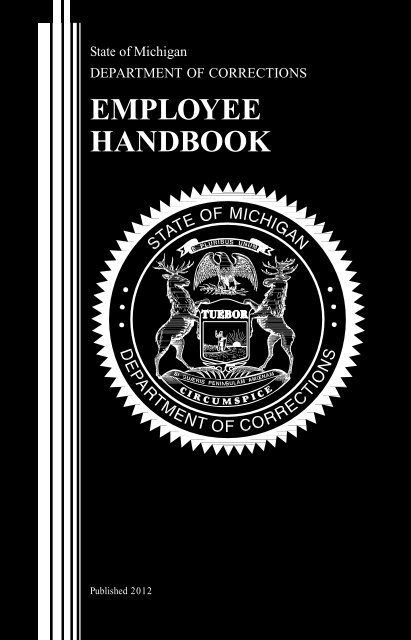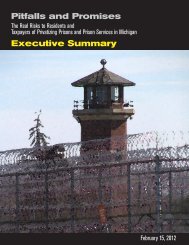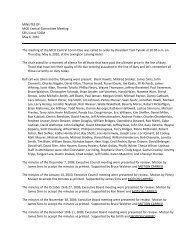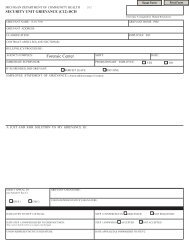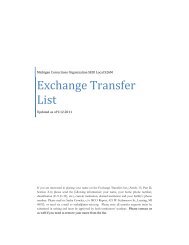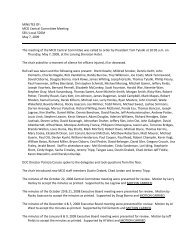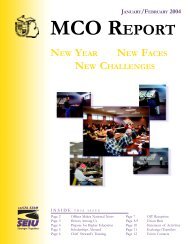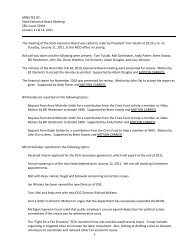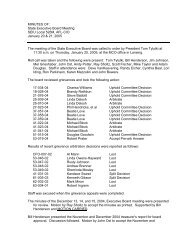MDOC Employee Handbook - Michigan Corrections Organization
MDOC Employee Handbook - Michigan Corrections Organization
MDOC Employee Handbook - Michigan Corrections Organization
- No tags were found...
Create successful ePaper yourself
Turn your PDF publications into a flip-book with our unique Google optimized e-Paper software.
State of <strong>Michigan</strong>DEPARTMENT OF CORRECTIONSEMPLOYEEHANDBOOKPublished 2012
MICHIGANDEPARTMENT OF CORRECTIONSEMPLOYEE HANDBOOKEffective DATE TBD, 2012No reproduction or use of this document outside the Department of<strong>Corrections</strong> is allowed without the expressed consent of the <strong>Michigan</strong>Department of <strong>Corrections</strong>
TABLE OF CONTENTSINTRODUCTIONMISSION AND VISION STATEMENTSOF THE MICHIGAN DEPARTMENT OFCORRECTIONSDEFINITIONSGENERAL INFORMATIONEqual Employment Opportunity .......................................5Discrimination ..................................................................5Political Activities ............................................................5Conflict of Interest ............................................................5Public Information ............................................................6<strong>Employee</strong> Services Program .............................................6<strong>Employee</strong> Grievance Procedure........................................6Changes in Employment Status ........................................7EMPLOYMENT REQUIREMENTSRole Models ......................................................................9Fitness for Duty ................................................................9Use of Leave ................................................................... 10Punctuality ..................................................................... 12Proper Notice of Absence ............................................... 12Jail Time or Other Restricted Supervision ...................... 13License, Certification or Similar Requirement ............... 14Training Requirements ................................................... 14Personal Information ...................................................... 15
DEPARTMENT WORK RULES#1 Humane Treatment of Individuals ........................ 16#2 Use of Position for Personal Gain ........................ 17#3 Discriminatory Harassment .................................. 18#4 Misuse of State or Other Agency Property orEquipment ............................................................ 19#5 Conduct Unbecoming ........................................... 20#6 Physical Contact ................................................... 20#7 Confidential Nature of Records ............................ 20#8 Use of Health Care Services ................................. 21#9 Class II Insubordination ....................................... 21#10 Class I Insubordination ......................................... 22#11 Searches While on Facility Property .................... 22#12 Responding or Assisting During an Emergency ... 22#13 Enforcing Rules, Regulations, Policies,Procedures, Post Orders and Work Statements .... 22#14 Maintaining Order ................................................ 23#15 Chain of Command .............................................. 23#16 Criminal Acts – Felony ........................................ 24#17 Controlled Substance/Intoxicant – Possession,Introduction or Attempted Introduction ............... 25#18 Use of Alcohol or Controlled Substance .............. 25#19 Rule Rescinded –Number Intentionally Not Reused ........................ 27#20 Introduction or Possession of Contraband Items .. 27#21 Contraband in Vehicle on the Premises of aFacility Housing Offenders ..................................27
#22 Misdemeanor or Other Restrictions ...................... 27#23 Possession and/or Use of Medication ................... 29#24 Rule Rescinded –Number Intentionally Not Reused ........................ 29#25 Rule Rescinded –Number Intentionally Not Reused ........................ 29#26 Entry Into a Facility .............................................. 30#27 Dereliction of Duty ............................................... 31#28 Use of Force ......................................................... 31#29 Exchange of Duties-Custody/Security ................. 31#30 Duty Relief............................................................31#31 Security Precautions ............................................. 31#32 Attention to Duty .................................................. 32#33 Reporting Violations ............................................ 33#34 Reporting Approach to Introduce Contraband,Violate Rules, Policies, Procedures, PostOrders or Work Statements .................................. 33#35 Rule Rescinded –Number Intentionally Not Reused ........................ 33#36 Rule Rescinded –Number Intentionally Not Reused ........................ 33#37 Rule Rescinded –Number Intentionally Not Reused ........................ 33#38 Reporting Requirements ....................................... 34#39 Rule Rescinded –Number Intentionally Not Reused ........................ 34#40 Rule Rescinded –Number Intentionally Not Reused ........................ 34
#41 Rule Rescinded –Number Intentionally Not Reused ........................ 34#42 <strong>Employee</strong> Uniform Requirements ........................ 34#43 Rule Rescinded –Number Intentionally Not Reused ........................ 34#44 Rule Rescinded –Number Intentionally Not Reused ........................ 35#45 Rule Rescinded –Number Intentionally Not Reused ........................ 35#46 Rule Rescinded –Number Intentionally Not Reused ........................ 35#47 Falsifying, Altering, Destroying, RemovingDocuments or Filing False Reports ...................... 35#48 Giving or Receiving Gifts or Services .................. 35#49 Rule Rescinded –Number Intentionally Not Reused ........................ 35#50 Overly-Familiar or Unauthorized Contact ............ 36#51 Sexual Conduct with Offender ............................. 39#52 Sexual Harassment of Offender............................ 40#53 Workplace Safety ................................................. 41#54 Misuse of Recording Devices or RecordedInformation ........................................................... 42
INTRODUCTIONThe purpose of this handbook is to provideemployees with information regarding employmentwith the <strong>Michigan</strong> Department of <strong>Corrections</strong>, toinform employees of basic employment requirements,and to provide notice of Department work rules andthe consequences of rule violations.Independent contractors and their employees areexpected to comply with Department rules. Failure todo so may result in termination of services with theDepartment.1
MISSION AND VISIONOF THEMICHIGAN DEPARTMENT OFCORRECTIONSAs Department of <strong>Corrections</strong>’ employees, we maintain highstandards of professional conduct. We treat each other, citizensand offenders with respect. Our mission defines the way weperform our jobs and demonstrates our commitment to “expectingexcellence every day” in everything we do.Our mission is to create a safer <strong>Michigan</strong> through effectiveoffender management and supervision in our facilities andcommunities while holding offenders accountable and promotingtheir rehabilitation.Our vision is based on the following principles:1) We will remain committed to the protection of the public,safety of our staff, and security of offenders.2) We will actively engage in the development of effectivecriminal justice policy.3) We will ensure sound management using proven fiscalpractices and outcome-oriented strategies.4) We will hire, train, equip, support, and mentor a high qualitystaff and hold them to the highest professional standards.5) We will provide humane and protective custodial care,rehabilitative opportunities, and reentry assistance foroffenders under our supervision.6) We will establish meaningful partnerships with public andprivate entities to assist us in successfully accomplishing ourmission.7) We will conduct all of our duties and responsibilities withthe highest degree of integrity, expectations for excellence,and respect for the value and dignity of human life.2
DEFINITIONSFor purposes of this document, the following definitionsshall be used:Contraband: any article not specifically authorized bypolicy including an employee’s personal property.Department: <strong>Michigan</strong> Department of <strong>Corrections</strong>.Discipline: actions taken upon substantiating a rule violationincluding written reprimands, suspensions withoutpay, involuntary demotions, discharges or unsatisfactoryservice ratings.Discriminatory Harassment: unwelcome advances,requests for favors, and other verbal or non-verbalcommunication or conduct (e.g. comments, innuendo,threats, jokes, pictures, gestures) based on race, color,national origin, disability, sex, sexual orientation, age,height, weight, marital status, religion, genetic informationor partisan considerations.<strong>Employee</strong>: any classified or unclassified employee of theState of <strong>Michigan</strong> in the Department of <strong>Corrections</strong>excluding any independent contractor or their employees.Facility: any property owned, leased, or occupied by theDepartment (e.g. hospitals, public works assignments,etc.).Offender: a prisoner or parolee under the jurisdiction ofthe <strong>Michigan</strong> Department of <strong>Corrections</strong> or housed in aDepartment facility, a probationer who is supervised by anemployee of the Department, or any person referred to theDepartment by the courts for investigation or supervision.Overfamiliarity: conduct which has resulted in or is likelyto result in intimacy; a close personal or non-work relatedassociation.3
Over-the-Counter Medication: medication which can bepurchased without a prescription in the United States.Prescription Medication: medication which cannot bepurchased without authorization from a licensed healthcare authority.Sexual Harassment of Offenders: sexual harassment includesverbal statements or comments of a sexual nature toan offender, demeaning references to gender or derogatorycomments about body or clothing, or profane or obscenelanguage or gestures of a sexual nature.Sexual Conduct with Offenders: the intentional touching,either directly or through clothing, of a prisoner’s genitals,anus, groin, breast, inner thigh, or buttock with the intent toabuse, arouse or gratify the sexual desire of any person.Invasion of privacy for sexual gratification, indecentexposure, or voyeurism. An attempted, threatened, orrequested sexual act or helping, advising, or encouraginganother employee to engage in a sexual act with anoffender.NOTE: The language of an applicable CollectiveBargaining Agreement or Civil Service Commission Rulesand Regulations supersede the provisions of the <strong>Employee</strong><strong>Handbook</strong> where in conflict.4
GENERAL INFORMATION1. EQUAL EMPLOYMENTOPPORTUNITYThe Department is committed to equal employmentopportunity. For more information, refer to PD02.06.100 “Equal Employment Opportunity.”2. DISCRIMINATIONAn employee shall not discriminate against a personon the basis of religion, sex, sexual orientation, race,color, national origin, age, weight, height, disability,marital status, genetic information or partisanconsiderations.3. POLITICAL ACTIVITIESClassified employees are restricted from certainpolitical activities by Civil Service Commission Rules.Refer to Section 1-12 “Political Activities” of the CivilService Commission Rules and PD 02.03.107 “Codeof Ethics and Conduct-<strong>Employee</strong>s” for details on theserestrictions.4. CONFLICT OF INTEREST<strong>Employee</strong>s are restricted from engaging in actionswhich may constitute a conflict of interest withemployment with the Department. Refer to Section 2-8 “Ethical Standards and Conduct” of the CivilService Commission Rules and PD 02.03.105“Outside Employment” for further details.5
5. PUBLIC INFORMATION<strong>Employee</strong>s speaking as a representative of theDepartment are responsible for the accuracy of theirstatements, are expected to reflect the position of theDepartment, and are to contact the Office of PublicInformation and Communications for current informationand the Department’s position on issues.<strong>Employee</strong>s making presentations on correctionalissues in a capacity other than as a representative ofthe Department shall inform the audience that theirremarks are not made in their official capacity as anemployee. <strong>Employee</strong>s are to be guided by PD02.03.106 “External Communications by <strong>Employee</strong>s”and PD 01.06.130 “Media Relations” when speakingto the public or the media.6. EMPLOYEE SERVICES PROGRAMThe <strong>Employee</strong> Services Program (ESP) providesservices to active State employees who areexperiencing problems or personal concerns that areaffecting their work. ESP also offers assessment andreferral for employees’ family members whenappropriate. ESP counselors provide assistance in theidentification and resolution of personal problems. Foradditional guidance refer to PD 02.04.107 “<strong>Employee</strong>Services Program,” or contact ESP at 1-800-521-1377in Lansing or 1-800-872-5563 in Detroit.7. EMPLOYEE GRIEVANCE PROCEDUREThe Civil Service Commission has established a grievanceprocedure for employees not covered by a laboragreement. Refer to the Civil Service Grievances,Technical Complaints, and Appeals Procedure formore information. This procedure is available inDepartment Human Resources Offices and/or on theCivil Service Web Site, Regulations, Chapter 8.6
<strong>Employee</strong>s covered by a labor agreement should referto the applicable collective bargaining agreement todetermine the grievance procedure which applies tothem.8. CHANGES IN EMPLOYMENT STATUSa. Separation: Voluntary/InvoluntaryAn employee is expected to give at least two weeksadvance notice before resigning, retiring, ortransferring. Such notice shall be provided to theemployee’s supervisor and Human Resources Office.If an employee is not rated satisfactory at the end ofhis or her initial probationary period (including anyextensions), the employee will be separated asprovided for in Civil Service Commission Rulesand/or applicable collective bargaining agreements.Initial probationary employees are afforded grievancerights within the Department as specified in theapplicable Civil Service Commission Rules orcollective bargaining agreement.An employee may be involuntarily separated or dischargedfor various reasons as specified by the CivilService Commission Rules, Department policies,and/or applicable collective bargaining agreement. Anemployee with status may have a review of thedischarge through the appropriate grievanceprocedure.An employee will receive payment for any unusedleave credits as authorized by the Civil ServiceCommission Rules or applicable collective bargainingagreement after separation.b. TransfersTransfer requests within the Department must be providedto the appropriate Human Resources Office andin accordance with any applicable collectivebargaining agreement.7
c. Promotion/DemotionAny promotion or advancement within the Departmentis determined by the employee’s past and present jobperformance, knowledge, skills, abilities, andeligibility. Some positions have residency requirementsas identified in PD 02.02.112 “Duty Schedules,Business Hours and Residence Requirements.”A demotion is an authorized movement of anemployee with status to a lower classification level.Voluntary or involuntary demotions are governed bythe Civil Service Commission Rules, Departmentpolicies, and/or the applicable collective bargainingagreement. An employee with status may have areview of an involuntary demotion through theappropriate grievance procedure.d. Position Classification ReviewIt may become necessary to review the class titles orlevels of positions due to changes that have takenplace in duties and responsibilities involved that mayimpact the proper classification of a position. Thesereviews are made by the Civil Service Commission. Ifan employee feels their current classification and leveldoes not reflect their present duties, an employee mayinitiate a review of his or her position. Refer to CivilService Commission Rules, Section 4-2 “PositionClassification Review.”e. RetirementThe Department has employees covered under variousretirement programs. There are several options as tohow your benefits will be paid upon retirement orprovided to a survivor. A description of these optionsis found in the information published by theDepartment of Technology, Management and Budget,Office of Retirement Services. Contact the Office ofRetirement Services at 1-800-381-5111 for moreinformation.8
EMPLOYMENT REQUIREMENTS<strong>Employee</strong>s shall comply with the following employmentrequirements. Failure to comply will generally result incorrective action, up to and including discharge.1. ROLE MODELSOne of the major objectives of the Department is to influenceand persuade offenders to become law-abidingcitizens. The on-duty and off-duty conduct ofDepartment employees must serve as an example ofproper conduct.2. FITNESS FOR DUTY<strong>Employee</strong>s are required to be physically and mentallyfit to perform regular and emergency duties.An employee, whose primary responsibility is acustody or security function and who incurs a duty ornon-duty injury or temporary disability, may berequired to submit medical information that s/he isable to perform regular and emergency duties beforereturning to active duty.<strong>Employee</strong>s who do not have primary custody orsecurity responsibilities must also be physically andmentally fit to perform their duties. If a non-custodyemployee incurs a duty or non-duty injury or temporarydisability, s/he will be permitted to work unlessit is determined that the injury/illness will interferewith the performance of their essential job duties.The Department may require a second medical opinionin accordance with the applicable collective bargainingagreement, Family and Medical Leave Act(FMLA), and/or Civil Service Commission Rules.9
Reasonable accommodations will be considered on acase-by-case basis for qualified persons with specificneeds under the Americans with Disabilities Act.3. USE OF LEAVEUse of leave (e.g. annual, sick, compensatory,school/community and banked leave time) is governedby Department policy, Civil Service CommissionRules and collective bargaining agreements. Anemployee may use annual leave, compensatory time,school/community or banked leave time only if priorapproval has been obtained from the propersupervisor. Advance approval can be any time prior toactual use of leave credits. Leave may not be usedbefore it is earned. <strong>Employee</strong>s are responsible toensure they have appropriate leave credits to cover theabsence. Refer to PD 02.02.100, “Time Utilization andCompensation” for more information.Administrative leave may be granted only inaccordance with PD 02.02.101 “AdministrativeLeave.”All sick leave used must be certified by the employee.The appointing authority may require verification asprovided by applicable Civil Service CommissionRules or collective bargaining agreements.Medical verification will be required under thefollowing conditions and may be required under otherconditions: When an employee has been counseled forexcessive use or abuse of sick leave within thepreceding six (6) months (1,044 actual work hours). When the employee has been hospitalized for anyreason.10
When an employee has been on sick leave for five (5)or more consecutive work days. When an employee has been absent as a result of anaccident, injury, or outpatient surgery. When an employee has requested annual leave andbeen denied and subsequently requests use of sickleave for the corresponding time. When an employee claims illness on the day of achange of assignment. When an employee’s sick leave credits have been reducedto sixteen (16) hours or less for reasons otherthan leaves of absence, FMLA, workers’ compensation,or death in the family. When the absence of a considerable number of employeeson a shift indicates a concerted effort amongthe employees at the work site, the appointingauthority shall immediately request medicalverification of each employee. When an employee establishes a pattern of absencesand/or emergency leave requests such as absence ona regular continuing basis on a given day of theweek, before or after a regular day off, a payday, ora holiday.<strong>Employee</strong>s must be notified of the requirement tosubmit medical verification of their temporary disabilityat the time of call-in or in advance if possible.<strong>Employee</strong>s must contact their Human ResourcesOffice to obtain the necessary requirements for medicalverification. Medical verification must be submittedprior to a return to work and may be submittedas applicable directly to the Human Resources Officeor the Disability Management Unit. Failure to providerequested medical verification at the time of the returnto work may result in the employee not being able towork.11
Authorization of leave credits does not prohibit theissuance of corrective or disciplinary action forunsatisfactory time and attendance.Refer to applicable collective bargaining agreements,Civil Service Commission Rules, and PD 02.02.102“Leave of Absence” regarding absence due to theFamily and Medical Leave Act or unpaid leave ofabsence.4. PUNCTUALITYRegular attendance and punctuality are required of allemployees. All employees are expected to adhere tothe work schedule approved by their supervisor and tobe at their assignment at the start of their shift or workday. In addition, all employees must adhere to specificfacility procedures for attendance accountability.5. PROPER NOTICE OF ABSENCEAny employee, who provides service to offenders orwith duties involving the direct management orobservation of offenders, must personally notifyhis/her supervisor or a designated person of anunscheduled absence no earlier than 30 minutes priorto the start of the employee’s shift but no later than thestart of the shift, or in accordance with the applicablecollective bargaining agreement. For example, anemployee with duties involving the direct managementor observation of offenders whose shift begins at 8:00a.m., must call in between 7:30 a.m. and 8:00 a.m.Health care employees with duties involving the directmanagement or observation of offenders must call intheir absence as soon as possible, but no later than 30minutes prior to the start of the employee’s shift.All other employees must notify the proper authorityof an unscheduled absence as soon as possible, but nolater than 30 minutes after their normal starting time.12
An employee who does not report for duty on theirregularly scheduled workday without proper leaveapproval, will be considered absent without leave.That employee shall receive lost time and be subject tocorrective action. The notice of an unscheduledabsence shall be made personally by the employee,unless physically unable to do so. Unauthorizedabsence by an employee for three (3) or moreconsecutive workdays may result in separation forunauthorized absence.The employee is responsible for providing updatedmedical documentation prior to the expiration of anypreviously submitted documentation for which s/he isabsent from work for an extended time or on a medicalleave of absence. Failure to provide updated medicaldocumentation within the expiration of the previouslysubmitted documentation may result in separation forvacating a position.6. JAIL TIME OR OTHERRESTRICTED SUPERVISIONNo employee shall be allowed to work while under anyelectronic monitoring supervision or device, housearrest, or sentenced to jail time for any reason,including weekends, even if granted a work releasepass. <strong>Employee</strong>s must use available annual leave,BLT, personal leave, or compensatory time whileserving jail time or under other restricted supervisionbefore being placed on lost time or requesting andbeing considered for approval for an unpaid leave ofabsence consistent with Civil Service CommissionRules and/or applicable collective bargaining agreement.13
7. LICENSE, CERTIFICATIONOR SIMILAR REQUIREMENT<strong>Employee</strong>s are responsible for maintaining any license,certification or similar requirement necessary to performthe duties of their assignment. <strong>Employee</strong>s shallnot be allowed to work in that position, and may besubject to immediate non-disciplinary separation ordisciplinary action up to and including discharge, if anecessary license, certification or similar requirementhas expired, been suspended or revoked.8. TRAINING REQUIREMENTS<strong>Employee</strong>s are required to attend and successfullycomplete new employee and in-service trainingsessions in accordance with PD 02.05.100 “New<strong>Employee</strong> Training Program,” and PD 02.05.101 “In-Service Training.”New employees who do not successfully complete therequired training program will be separated.<strong>Employee</strong>s who are authorized to carry a concealedweapon or use any firearm on duty must take andsatisfactorily complete training instruction inaccordance with policy on a prescribed time schedule.<strong>Employee</strong>s will only be assigned to armed duties aftermeeting the qualifying standard for each individualtype of firearm and chemical agent necessary for thatassignment. As required by Department policy, inorder to continue employment in such positions,employees must periodically re-qualify with theappropriate firearm(s) and chemical agents. Refer toPD 03.03.100 “Firearms and Chemical Agents”(Exempt) for additional information on weaponpossession and use.14
9. PERSONAL INFORMATIONTo assist the Human Resources Offices in maintainingcomplete and accurate personnel files, an employeemust immediately supply a written report to theHuman Resources Office regarding any change inpersonal status. Some changes may require completionof forms that are available in the Human ResourcesOffices or through MI HR Self Service.Immediate reporting of changes in personalinformation will help avoid inaccurate payrolldeductions, loss of insurance benefits for dependents,delays in payroll processing, or the Department’sinability to contact family members in emergencies.Supervisors and employees whose primaryresponsibility is the custody, security, medical care,supervision, or investigation of offenders are requiredto have a working telephone by which they can becontacted. All other employees must provide theirwork location with a means to contact them within areasonable period of time.Current telephone numbers for employees as well asthe home and street address of all employees must beon file at their Human Resources Office and worklocation. All employees are required to comply withresidency and telephone requirements as specified inPD 02.02.112 “Duty Schedules, Business Hours andResidence Requirements.”15
DEPARTMENT WORK RULESIn accordance with PD 02.03.100 “<strong>Employee</strong> Discipline,”OP 02.03.100-A “<strong>Employee</strong> Discipline” and the applicablecollective bargaining agreement, an employee who violatesDepartment or Civil Service Commission Rules,regulations, policies, procedures, post orders or workstatements or conditions of employment will be subject todisciplinary action.Conduct violating any of the following rules will subject anemployee to disciplinary action up to and includingdischarge. Refer to PD 02.03.100 “<strong>Employee</strong> Discipline”and the applicable collective bargaining agreement forinformation relating to an employee’s right to representation.Any violation of rules occurring prior to the effective dateof this handbook will continue to be disciplined based onthe rule and policy in effect at the time of the infraction.<strong>Employee</strong>s are prohibited from retaliating against anyperson who reports rule violations. <strong>Employee</strong>s shall notdisclose to anyone that a work rule violation report hasbeen filed, the details of the report, and/or the status of anyinvestigation, except as required to comply with Departmentpolicy or to provide information to their representativein an administrative, civil or criminal proceeding.1. HUMANE TREATMENT OFINDIVIDUALS<strong>Employee</strong>s are expected to treat individuals in ahumane manner in the workplace or while on duty.Examples of actions of an employee in violation of thisrule are described below. This is not an exhaustive listof behavior which may be in violation of this rule.16
Displaying a weapon (firearm, taser, etc.) orobject for the purpose of intimidating an offender,visitor, volunteer, employee or citizen, except inthe performance of an employee’s duties. See PD04.05.100 “Disturbance Control” (Exempt), PD04.05.110 “Use of Force” (Exempt) and PD04.05.112 “Managing Disruptive Prisoners”(Exempt) for direction regarding control ofoffenders.Using speech, action, gesture, or movement thatcauses physical or mental intimidation orhumiliation.Failing to try to secure necessary medical or otherassistance in instances of medical emergencies,injury, assault or attempted suicide.Making unnecessary or unreasonable rules for anemployee, visitor, volunteer or an offender tofollow.Using abusive or profane language or actionswhich degrade or belittle another person or group.2. USE OF POSITION FOR PERSONAL GAIN<strong>Employee</strong>s shall not engage in actions that couldconstitute the use of their position for personal gain.Examples of actions of an employee in violation of thisrule are described below. This is not an exhaustive listof behavior which may be in violation of this rule.Displaying his/her Department-issued identificationcard or badge, or referencing theiremployment or position with the Department forother than a work-related reason.Obtaining goods or services that would otherwisenot be available or offered to the employee if notfor his/her position.17
Obtaining information, assistance or leniencyfrom another law enforcement or criminal justiceagency.Examples are not intended to restrict an employeefrom taking advantage of such things as retaildiscounts, which a business may offer to all membersof a group, such as law enforcement or criminal justiceprofessionals.For additional information refer to PD 02.03.107“Code of Ethics and Conduct - <strong>Employee</strong>s” and CivilService Commission Rule 2-8 “Ethical Standards andConduct.”3. DISCRIMINATORY HARASSMENT<strong>Employee</strong>s shall not discriminate or engage indiscriminatory harassment. Discriminatory harassmentincludes unwelcome advances, requests for favors andother verbal and non-verbal communication or conductbased on race, color, national origin, disability, sex,sexual orientation, age, height, weight, marital status,religion, genetic information or partisan considerations.<strong>Employee</strong>s must report any incidents of such conductto the designated discriminatory harassment counseloror to the appropriate supervisor. For specific informationpertaining to confidentiality and reportingrequirements, refer to PD 02.03.109 “DiscriminatoryHarassment.”<strong>Employee</strong>s are prohibited from retaliating against aperson because the person has made a complaint,either orally or in writing, of discrimination ordiscriminatory harassment based on race, color,national origin, disability, sex, sexual orientation, age,height, weight, marital status, religion, geneticinformation or partisan considerations.18
4. MISUSE OF STATE OR OTHER AGENCYPROPERTY OR EQUIPMENT<strong>Employee</strong>s shall not misuse State or other agencyproperty.Examples of actions of an employee in violation of thisrule are described below. This is not an exhaustive listof behavior which may be in violation of this rule.Using State or agency property for personalpurposes or purposes beyond that of their officialjob duties without proper authorization.Use of computers, printers, faxes, etc., for nonworkrelated activities.Inappropriate use of the internet.Removing items from State or other agencypremises without proper authorization.In addition to any disciplinary action that may beimposed, an employee who misuses State or otheragency property will be responsible for any consequencesresulting from that misuse (e.g. civil orcriminal charges or penalties), and may be required toreimburse the affected agency for its value. Propertymust be kept clean and in good condition at all timesand immediately returned upon leaving the Department.State-operated recreation facilities and equipment maybe used by off-duty personnel for physical fitness orrehabilitation purposes with the approval of theappropriate Warden or Administrator. Such activity isvoluntary and the Department will not be responsiblefor accidents or injuries.19
5. CONDUCT UNBECOMING<strong>Employee</strong>s shall not behave in an inappropriatemanner or a manner which may harm or adverselyaffect the reputation or mission of the Department.<strong>Employee</strong>s have a special responsibility to serve asrole models. <strong>Employee</strong>s must also support and upholdthe law through their own actions and personalconduct.If an employee is arrested for or charged with acriminal offense, the behavior shall be investigated todetermine whether such activity violates this rule.Violation of this rule is not contingent upon whetheror not an employee has been arrested. If theinvestigation establishes a violation of this rule,whether it occurred on or off duty, disciplinary actionup to and including discharge may result regardless ofany prosecutorial action or court disposition.Any conduct by employees involving theft shall resultin discharge.6. PHYSICAL CONTACTInappropriate physical contact is prohibited. Examplesinclude, but are not limited to, inappropriate placing ofhands on another person, horseplay, or other types ofbody contact, including body contact with an object.Examples of appropriate physical contact include, butare not limited to, a handshake at an offender’sgraduation; at the beginning or end of a meeting; orduring times of accomplishment and achievement.7. CONFIDENTIAL NATURE OF RECORDS<strong>Employee</strong>s shall respect the confidentiality ofemployee, offender and health care information(including electronic records). <strong>Employee</strong>s shall notshare confidential information, other officialinformation, or reports with unauthorized persons.20
Information is not to be divulged for other thanlegitimate authorized business purposes. Refer to PD02.01.140 “Human Resources Files,” PD 03.02.100“Health Services” and PD 03.04.108 “Prisoner HealthInformation.”No offender file may be removed from a facilitywithout the approval of the Director or respectiveDeputy Director, Regional Prison Administrator,Warden or Field Operations Administration RegionalAdministrator unless required as part of theemployee’s official job duties. Offender health careinformation can only be released with a proper releaseof information signed by the offender, pursuant to asubpoena or court order, or under PD 03.04.108“Prisoner Health Information.”8. USE OF HEALTH CARE SERVICES<strong>Employee</strong>s shall only use the facility health careservices in cases of emergency, medical stabilizationfor serious on-the-job injuries, and Departmentauthorized services, such as TB tests and Hepatitis Bvaccinations. When the clinic facilities are used for anemergency or on-the-job injury, the employee is to betransferred as soon as practical to a physician orhospital. A written report must be made by the clinicstaff in each of these instances and sent to theappropriate Warden, Human Resources Office and theAdministrator of the Bureau of Health Care Services.9. CLASS II INSUBORDINATIONWillful acts of employees contrary to managementdirectives that may compromise the Department’sability to carry out its responsibilities, such asoperation of safe and secure facilities or protection ofthe public, are prohibited. Violation of this rule shallresult in discharge.21
10. CLASS I INSUBORDINATIONInsubordination is the disregard of authority or refusalto immediately follow management directives.<strong>Employee</strong>s are prohibited from actions or inactionsshowing disregard of authority or failing toimmediately follow management directives.11. SEARCHES WHILE ON FACILITYPROPERTYAll employees are subject to authorized searches whileon facility property. <strong>Employee</strong>s who refuse to submitto an authorized search will be suspended immediatelypending investigation. Violation of this rule shall resultin discharge.12. RESPONDING OR ASSISTING DURING ANEMERGENCYAll employees of the Department, regardless of classification,have security responsibility. <strong>Employee</strong>s shallimmediately respond to any request for assistanceduring an emergency, including emergency preparednessdrills and mobilizations. An employee shallcome to the assistance of another employee, offender,visitor, volunteer, etc., who is in distress or any otheremergent situation.13. ENFORCING RULES, REGULATIONS,POLICIES, PROCEDURES, POSTORDERS AND WORK STATEMENTSAll employees shall be familiar with, enforce andfollow all Department rules, regulations, policies,procedures, post orders and work statements. Anemployee shall not undermine or interfere with theDepartment’s efforts to enforce rules, regulations,policies, procedures, post orders and work statements.22
14. MAINTAINING ORDERAny action or inaction by an employee that maydetract from maintaining order of Departmentoperations is prohibited.15. CHAIN OF COMMAND<strong>Employee</strong>s shall follow their chain of command.Proper morale and discipline require a recognition ofauthority within the various units and divisions of theDepartment. It is important to know the immediatesupervisory official in charge so that all work-relatedquestions are addressed to the proper person.Complaints and concerns shall be submitted to theimmediate supervisor for resolution before going to ahigher level, or to an outside source.An employee may bypass an immediate supervisoronly in an emergency or in accordance with specificDepartment policies. Supervisors shall inform theiremployees whom they should contact in cases ofemergency, questions or problems. If the chain ofcommand is not followed, issues should be sent backto the proper supervisor by the recipient.The requirement to follow chain of command is notintended to abrogate the ability of employees to filecomplaints under their respective collective bargainingagreement or under the Whistleblowers’ ProtectionAct, PA 469 of 1980, as amended, or other State orfederal law, to report a violation or suspected violationof the law.CRIMINAL ACTS, CONTRABAND ANDCONTROLLED SUBSTANCESWork Rule #5 and Work Rules #16 through #22 prohibitbehavior involving criminal acts, contraband, andcontrolled substances both on and off duty. Controlledsubstances are defined in the <strong>Michigan</strong> Public Health Code.23
The Department has a zero-tolerance policy regardingemployees possessing, using, or introducing controlledsubstances into a facility where offenders are housed orassigned. Zero tolerance means if a preponderance ofevidence demonstrates that an employee has used,possessed, attempted to introduce, or otherwise involvedthemselves with controlled substances, s/he will bedischarged.The presence of contraband within correctional facilitiesand other settings where offenders are housed presents asafety and security risk and is therefore prohibited. For thisreason, employees are responsible for any item within theirarea of control which includes, but is not limited to, theautomobile they have driven, their clothing, and withinpurses and briefcases.<strong>Employee</strong>s are subject to drug and alcohol testing pursuantto Civil Service Commission Rules or the provisions of anapplicable collective bargaining agreement.16. CRIMINAL ACTS – FELONY<strong>Employee</strong>s shall not engage in any conduct, whetheron one’s own time or in connection with officialduties, which results in a felony conviction, whetherby guilty plea, no contest plea, delayed or deferredsentence or trial. A felony conviction shall result indischarge.Felonious behavior not resulting in a felony convictionmay still result in disciplinary action up to andincluding discharge for violation of Work Rule #5“Conduct Unbecoming.”<strong>Employee</strong>s shall provide a verbal report to theirimmediate supervisor, or if unavailable to the nextavailable manager in their chain of command, within24 hours after any felony citation or arrest. This verbalreport shall be followed up within 72 hours with awritten report by the employee to the appropriateDeputy Director, Administrator or Warden.24
<strong>Employee</strong>s shall also provide written reports to theirimmediate supervisor within 24 hours after any stageor phase of an arrest or prosecution including but notlimited to: issuance of any warrant, any arraignments,any pre-trial conferences, pleas of any kind,preliminary examination, trial, conviction, sentencing,delay, deferral, diversion, or dismissal. <strong>Employee</strong>scharged with a felony will be suspended without paypending the outcome of the criminal charges.Failure to report as required by this rule shall result indisciplinary action for violation of Work Rule #38“Reporting Requirements.”17. CONTROLLED SUBSTANCE/INTOXICANT– POSSESSION,INTRODUCTION OR ATTEMPTEDINTRODUCTIONPossessing, introducing, or attempting to introducecontrolled substances or intoxicants into any facilitywhere offenders are supervised shall result indischarge and possible referral for prosecution. Thisdoes not include items brought in by a clergy asallowed per PD 04.04.110 “Search and Arrest inCorrectional Facilities” and/or MCL 800.281.<strong>Employee</strong>s shall not possess, introduce, or attempt tointroduce into any facility where offenders aresupervised any other substances, such as yeast, whichcan be used to manufacture a prohibited or illegalsubstance.18. USE OF ALCOHOL OR CONTROLLEDSUBSTANCE<strong>Employee</strong>s are subject to random, reasonablesuspicion, pre-appointment, post accident, and followupdrug and alcohol testing in accordance with CivilService Commission Rule 2-7 or applicable collectivebargaining agreement. An employee who reports for25
duty with alcohol on his/her breath, or when suspectedof being under the influence of alcohol or a controlledsubstance, will be required to submit to an evidentialbreath test or appropriate drug test.<strong>Employee</strong>s shall comply with all requirements of theCivil Service Commission Rule, the applicablecollective bargaining agreement, and this work rule. Aviolation of Provision A below shall result indisciplinary action up to and including discharge. Aviolation of B, C, D, E, F or G below shall result indischarge and the employee will not be eligible forrehire with the Department.The following are prohibited activities for allemployees:A. Consuming alcohol while on duty, or reporting forduty or being on duty with a blood alcoholconcentration of .02 or greater percent by weightin the blood but less than .08.B. Reporting for duty or being on duty with a bloodalcohol level of .08 or higher.C. Using a controlled substance on duty unless usedas prescribed by a physician except as addressedin Provision G below.D. Reporting for duty or being on duty with a prohibitedlevel of a controlled substance.E. Refusing to submit to a required drug test oralcohol test. Refusal to submit to a drug and/oralcohol test means any of the following: 1) failingto provide an adequate sample without medicalexplanation, 2) engaging in conduct that obstructsthe testing process, or 3) refusing to be tested.F. Interfering with any testing procedure ortampering with any test sample.G. Using medical marihuana (marijuana) isprohibited.26
19. RULE RESCINDED IN 2000. NUMBERINTENTIONALLY NOT REUSED.20. INTRODUCTION OR POSSESSION OFCONTRABAND ITEMS<strong>Employee</strong>s shall not introduce or possess unauthorizeditems such as escape paraphernalia, weapons,facsimiles of weapons, ammunition, wireless communicationdevices, cell phones, tobacco or facsimilesof tobacco products (e.g. electronic vapor cigarettes),lighters or any other item not specifically authorizedby PD 04.04.100 “Custody, Security and SafetySystems” (Exempt) or facility operating procedure inany facility where offenders are housed.21. CONTRABAND IN VEHICLE ON THEPREMISES OF A FACILITY HOUSINGOFFENDERS<strong>Employee</strong>s shall lock or properly secure any vehicle(including jeeps, motorcycles, bicycles, etc.) broughtonto the premises of a facility housing offenders.<strong>Employee</strong>s are responsible for ensuring that unauthorizeditems such as alcohol, controlled substances,weapons, ammunition, or facsimiles thereof are not inthe vehicle. It will be assumed the employee wasaware of the presence of the prohibited item if it isfound in the vehicle. Violations of this rule may resultin criminal prosecution. See PD 03.03.100 “Firearmsand Chemical Agents” (Exempt) regarding the properhandling and storage of weapons.22. MISDEMEANOR OR OTHERRESTRICTIONSAny conduct by an employee, whether on one’s owntime or in connection with official duties, whichresults in a misdemeanor conviction (includingdiversion programs), whether by guilty plea, no27
contest plea, delayed or deferred sentence, or trial, isprohibited.Behavior not resulting in a misdemeanor convictionmay still result in disciplinary action up to andincluding discharge for violation of Work Rule #5“Conduct Unbecoming.” Traffic offenses that are notmisdemeanors do not need to be reported.<strong>Employee</strong>s shall provide a verbal report to theirimmediate supervisor or, if unavailable, to the nextavailable manager in their chain of command within24 hours after any stage or phase of an arrest orprosecution including but not limited to: issuance ofany warrant, any arraignments, any pre-trialconferences, pleas of any kind, preliminaryexamination, trial, conviction, sentencing, delay,diversion or dismissal. Each verbal report shall befollowed up within 72 hours with a written report bythe employee to the appropriate Deputy Director,Administrator or Warden.Restrictions, such as a restricted or suspended driver’slicense or a personal protection order, must be verballyreported to the employee’s immediate supervisorwithin 24 hours of becoming aware of the action todetermine whether the restriction or personalprotection order has an adverse impact on theemployee’s ability to perform his/her workassignment. Each verbal report shall be followed upwithin 72 hours with a written report by the employeeto the appropriate Deputy Director, Administrator orWarden.In addition to Work Rule #22 “Misdemeanor or OtherRestrictions,” failure to report as required by this ruleshall result in disciplinary action for violation of WorkRule #38 “Reporting Requirements.”A misdemeanor conviction for a violation of theControlled Substance Act or criminal sexual conductshall result in discharge.28
An employee who is discharged for violation of thisrule or who resigns in lieu of termination during aninvestigation will not be eligible for rehire with theDepartment.23. POSSESSION AND/OR USE OFMEDICATION<strong>Employee</strong>s shall immediately notify their supervisor iftaking prescribed medication which may interfere withthe employee’s work responsibilities.In addition, an employee who has duties involving thedirect management or observation of offenders shallimmediately provide written notice to the Warden orappropriate Administrator, through the HumanResources Office, of a prescribed medication thatcould reasonably be expected to affect the work performed.Such medication includes, but is not limitedto: narcotic pain medication, psychotropic medication,mood altering medication, and antihistamines.<strong>Employee</strong>s must submit the “<strong>Employee</strong> MedicationRequest” form (CAJ-555) when taking prescribedmedication which may interfere with their workresponsibilities. If there is a question on the effects ofthe medication, the employee shall be required toprovide medical clarification from a licensed physician.If the medication does not adversely affect jobperformance and needs to be taken at work, theWarden or appropriate Administrator will provide away for the employee to take the medication byapproving the CAJ-555 form.24. RULE RESCINDED IN 2000. NUMBERINTENTIONALLY NOT REUSED.25. RULE RESCINDED IN 2000. NUMBERINTENTIONALLY NOT REUSED.29
26. ENTRY INTO A FACILITY<strong>Employee</strong>s shall not visit non-public areas of a facilitywhere offenders are housed for non-work related purposeswithout prior approval of the Warden,appropriate Administrator, or designee. Off-dutyemployees are required to receive permission to enteror be present at any secure area of a facility.<strong>Employee</strong>s visiting any facility where offenders arehoused shall sign the facility visitor’s log.An employee may visit an offender only if thatoffender is an immediate family member and is housedat a facility other than where the employee works. Forpurposes of this rule “immediate family member” isdefined as grandparent, parent, stepparent, spouse,mother-in-law, father-in-law, child, stepchild, grandchild,sibling, stepbrother and stepsister. An aunt anduncle may be included if adequate verification isprovided that they served as a surrogate parent.Visitation at an institution shall take place inaccordance with PD 05.03.140 “Prisoner Visiting.”Visiting an immediate family member who is anoffender housed in a facility requires prior permissionof both the appointing authority where the offender ishoused and the employee’s appointing authority.Visiting an immediate family member who is anoffender housed in a jail and under Departmentsupervision or jurisdiction requires prior writtenapproval from the employee’s appointing authority,and an approved “Offender Contact ExceptionRequest” form (CAJ-202) on file. If the immediatefamily member is not under Department supervision orjurisdiction, prior written approval is not required.30
27. DERELICTION OF DUTY<strong>Employee</strong>s shall fully perform their job duties. Anyaction or omission of an employee indicating neglectof his/her job duties, including but not limited to thesafe and proper care and control of offenders, failureto make all required rounds, required field agentcontacts, or participation in recreational activities withoffenders while on duty, will be considered derelictionof duty.28. USE OF FORCE<strong>Employee</strong>s shall use the least amount of forcenecessary to perform their duties consistent with theprovisions of PD 04.05.110 “Use of Force” (Exempt)and PD 04.05.112 “Managing Disruptive Prisoners”(Exempt). Excessive use of force shall result indischarge.29. EXCHANGE OF DUTIES-CUSTODY/SECURITY<strong>Employee</strong>s shall not exchange duties or responsibilitieswithout prior explicit permission from theimmediate supervisor.30. DUTY RELIEF<strong>Employee</strong>s shall not leave an assignment withoutproper relief or authorization.31. SECURITY PRECAUTIONSAny action or inaction by an employee whichjeopardizes the safety or security of employees, thepublic or offenders is prohibited.Examples of actions of an employee in violation ofthis rule are described below. This is not an exhaustivelist of behavior which may be in violation of this rule.31
Failure to keep assigned weapons properlysecured, clean and in working order, properlyloaded and at hand for immediate use.Loss of security equipment (e.g. keys, handcuffs,radios, ERT equipment, etc.). Failure to follow specific security detailinstructions.Failure to follow PD 04.04.110 “Search and Arrestin Correctional Facilities.”Failure to follow critical/dangerous tool policy asindicated in PD 04.04.120 “Tool Control.”Propping open security doors or doors that shouldremain locked.Allowing unknown or unidentified individuals intobuildings. Unauthorized distribution of exempt policydirectives or operating procedures.Failure to follow security precautions as outlinedin PD 03.03.100 “Firearms and Chemical Agents”(Exempt).32. ATTENTION TO DUTY<strong>Employee</strong>s shall remain alert while on duty. Sleepingor failure to properly observe an assigned area oroffenders, including missing post checks, are examplesof inattention to duty.Items that detract from the alertness of an employeeare not allowed. <strong>Employee</strong>s with duties involving thedirect management or observation of offenders shallnot have unauthorized electronic devices, computergames, books, pamphlets, newspapers, or otherreading materials while on duty, except for postorders, a copy of the applicable collective bargainingagreement, and information specific to theperformance of job-related duties.32
All other employees may possess such items at theirwork site but are prohibited from using them while onduty except when they fall within the scope of theirassigned duties.33. REPORTING VIOLATIONS<strong>Employee</strong>s shall immediately report behavior which isin violation of Departmental rules, policies,procedures, work statements or post orders, etc., tosupervisory staff.Failure to report conduct involving drugs, escape,sexual misconduct, sexual harassment, workplacesafety or excessive use of force will aggravate thepenalty up to and including discharge.34. REPORTING APPROACH TO INTRODUCECONTRABAND, VIOLATE RULES,POLICIES, PROCEDURES, POST ORDERSAND WORK STATEMENTS<strong>Employee</strong>s shall report each time they are approachedto introduce contraband or violate rules, policies,procedures, post orders or work statements. A verbalreport of the approach shall be made immediately tothe employee’s supervisor and a complete writtenreport of the approach must be made no later than theend of the employee’s work day.35. RULE RESCINDED IN 2000. NUMBERINTENTIONALLY NOT REUSED.36. RULE RESCINDED IN 2000. NUMBERINTENTIONALLY NOT REUSED.37. RULE RESCINDED IN 2012. NUMBERINTENTIONALLY NOT REUSED.33
38. REPORTING REQUIREMENTS<strong>Employee</strong>s shall timely submit accurate and completeoral and written reports when required by Departmentpolicy, procedure, post order or work statement, orwhen requested by a supervisor or other authorizedpersonnel. Failure to provide reports that are accurateand complete is a violation of this work rule.39. RULE RESCINDED IN 2012. NUMBERINTENTIONALLY NOT REUSED.40. RULE RESCINDED IN 2000. NUMBERINTENTIONALLY NOT REUSED.41. RULE RESCINDED IN 2000. NUMBERINTENTIONALLY NOT REUSED.42. EMPLOYEE UNIFORM REQUIREMENTS<strong>Employee</strong>s shall not wear a Department uniformexcept in the performance of duty, while representingthe Department in an official capacity, or direct travelto and from the work site. Refer to PD 02.03.103“<strong>Employee</strong> Uniforms” for additional restrictions.<strong>Employee</strong>s required to be in uniform must wear andreturn the entire uniform as provided in PD 02.03.103“<strong>Employee</strong> Uniforms” and PD 02.03.121 “SpecialAlternative Incarceration Program – <strong>Employee</strong> Uniforms.”Substitution of other types of clothing for partsof the uniform or alterations of the uniform arepermitted only when clearly authorized under policy orcontractual guidelines. The uniform shall be clean andneat at all times.43. RULE RESCINDED IN 2000. NUMBERINTENTIONALLY NOT REUSED.34
44. RULE RESCINDED IN 2000. NUMBERINTENTIONALLY NOT REUSED.45. RULE RESCINDED IN 2000. NUMBERINTENTIONALLY NOT REUSED.46. RULE RESCINDED IN 2006. NUMBERINTENTIONALLY NOT REUSED.47. FALSIFYING, ALTERING, DESTROYING,REMOVING DOCUMENTS OR FILINGFALSE REPORTS<strong>Employee</strong>s shall not falsify, alter, destroy or removedocuments, including but not limited to, employmentapplications, data entries, log book entries, door cardentries, rounds, OMNI entries, investigative reports,time and attendance records (both electronic and hardcopy), misconduct reports, health care providerstatements, receipts, travel vouchers or databases.Fraudulent reporting of an employee’s time throughthe time clock or the State’s automated payroll systemis expressly prohibited. Violation of this rule shallresult in discharge.<strong>Employee</strong>s who file a false complaint will beconsidered to have violated this rule.48. GIVING OR RECEIVING GIFTS ORSERVICES<strong>Employee</strong>s are forbidden from exchanging with,giving to, or accepting gifts or services from anoffender, including but not limited to: food andbeverage items; shoe shines or any other item neithernecessary for, nor related to, the performance of theirofficial work-related responsibilities.49. RULE RESCINDED IN 2012. NUMBERINTENTIONALLY NOT REUSED.35
50. OVERLY-FAMILIAR ORUNAUTHORIZED CONTACTOVERFAMILIARITY PROHIBITED<strong>Employee</strong>s are prohibited from engaging inoverfamiliarity with an offender, or a family memberor listed visitor of an offender.It is prohibited for employees to have a nonprofessionalrelationship with an offender, theoffender’s family or their listed visitors. This rulegives examples of prohibited conduct, but is notintended to be all inclusive. <strong>Employee</strong>s shall avoid anyappearance of impropriety with offenders, offenders’family members and their listed visitors. However,contact with an offender, his/her family, or supportsystem in the community is permitted in theperformance of their duties in order to developprofessional relationships with individuals who arepart of the offender’s support system. This contactshall be narrowly focused on the offender’s success,with activities being documented in OMNI case notesfor active offenders.For purposes of this rule, “Listed Visitor” means aperson on an offender’s approved visitors list asprovided in PD 05.03.140 “Prisoner Visiting.”Non-work relationships with offenders, other than anemployee with his/her approved family member, areprohibited regardless of when the relationship began.Relationships with an offender which existed prior tooffender status involving children of the employee andthe offender will be evaluated on a case-by-case basisthrough submission of an “Offender Contact ExceptionRequest” form (CAJ-202).Relationships with an offender’s family member orvisitor which existed prior to offender status occurringwill be reviewed on a case-by-case basis throughsubmission of a CAJ-202 form.36
Unless approved by the appropriate Executive PolicyTeam member, an employee shall not live with, norprovide lodging for, an offender except if the offenderis a family member of the employee, including aspouse where the employee’s marriage to the offenderexisted prior to the employment date or where thespouse became an offender after the employment date.In all cases where the employee lives with or provideslodging to an offender who is a family member, thismust be immediately reported in writing to theemployee’s Warden or appropriate Administrator.PERMISSIBLE CONTACT<strong>Employee</strong>s may have contact with another employeeof the Department who is the family member of anoffender. Approval from the appropriate ExecutivePolicy Team member or designee, or an “OffenderContact Exception Request” form is not required forsuch contact.<strong>Employee</strong>s may have contact with their immediatefamily, which is defined as spouse, parent(s), childrenor step-children, brother(s), sister(s), parent(s)-in-law,grandparent(s), grandchild(ren) and any person(s)whose financial or physical care the employee isprincipally responsible. The CAJ-202 form is notrequired for employees to have contact with anoffender who is a member of that employee’simmediate family. However, the employee is requiredto immediately provide written notice of the contact tothe Warden or appropriate Administrator.REPORTING REQUIREMENTS ANDAPPROVAL PROCESSIf contact is made with an offender, a family memberof an offender or a listed visitor of an offender outsidethe course of an employee’s job duties, such contactmust be reported in writing to the employee’simmediate supervisor or, if unavailable, to the nextavailable supervisor in their chain of command by the37
end of the employee’s next regularly scheduledworkday. Such reporting is not required if a writtenexception (CAJ-202 form) has been granted.<strong>Employee</strong>s shall not make any contact with anyoffender, any family member of an offender, or a listedvisitor of an offender outside the regular performanceof the employee’s job duties unless approval has beengranted in writing by the appropriate Executive PolicyTeam member or designee. <strong>Employee</strong>s shall use formCAJ-202 “Offender Contact Exception Request” torequest such an exception. Offender ContactException Requests must be renewed whenever achange in the offender’s status occurs, the employee’sclassification or worksite changes, or relationship tothe offender, family member of offender, or visitorchanges. A copy of all requests shall be retained in theemployee’s personnel file.EXAMPLESUnless the contact is work related or an exception hasbeen granted pursuant to this rule, examples ofbehavior which presume overfamiliarity include, butare not limited to: Giving or receiving non-work related letters,messages, money, personal mementos, pictures,telephone numbers, legal or other services to or froman offender or a family member or a listed visitor ofan offender. Being at the residence of an offender or a familymember or listed visitor of an offender or thembeing at an employee’s residence. Non-work related contact or visits with an offenderor a family member or listed visitor of an offenderwithout authorization. Any relationship with an offender, their familymember or listed visitors that begins after offenderstatus occurred.38
Conversation of a sexual or romantic nature. Sexual misconduct or sexual harassment of an offender’sfamily members or listed visitors. Financial involvement with offenders, family membersof offenders, or listed visitors. Working for or employing an offender or theirfamily member(s). Visiting or corresponding with an offender or theirfamily, or listed visitors. Having knowledge of or assisting another employeeto engage in overfamiliarity. Renting property to an offender or an offender’sfamily member or listed visitors.Failure to report unauthorized contact until suchcontact is detected shall be considered an aggravatingfactor for determining the level of discipline issued.Any violation of this rule will be grounds fordischarge.An employee who is discharged for violation of thisrule or who resigns during an investigation for overfamiliarityand other conduct prohibited by policiesestablished pursuant to these topics or failure to reporta violation of Department policy or work rules in theseareas will not be eligible for rehire with theDepartment.51. SEXUAL CONDUCT WITH OFFENDER<strong>Employee</strong>s shall not engage in sexual conduct with anoffender. Examples of actions of an employee inviolation of this rule are described below. This is notan exhaustive list of behavior which may be inviolation of this rule. An attempted, threatened, or requested sexual actor helping, advising, or encouraging anotheremployee to engage in a sexual act. This includesassisting the violator in avoiding discovery.39
The intentional touching, either directly orthrough clothing, of an offender’s genitals, anus,groin, breast, inner thigh, or buttocks with theintent to abuse, arouse, or gratify the sexual desireof any person. This conduct is a criminal offenseunder <strong>Michigan</strong> Penal Code 750.520c.Invasion of privacy for sexual gratification,indecent exposure or voyeurism.An employee shall not be eligible for rehire with theDepartment, who:A. Is discharged for any violation of this rule.B. Resigns during an investigation for sexualconduct, sexual harassment, or other conduct prohibitedby policies established pursuant to thesetopics.C. Fails to report a violation of Department policy orwork rules in these areas.For additional information, refer to PD 03.03.130“Humane Treatment and Living Conditions for Prisoners”and PD 03.03.140 “Prohibited Sexual ConductInvolving Prisoners.”Any violation of this work rule shall result indischarge and may lead to criminal prosecution.52. SEXUAL HARASSMENT OF OFFENDER<strong>Employee</strong>s shall not engage in sexual harassment ofan offender. <strong>Employee</strong>s shall not assist, advise orencourage another to engage in sexual harassment, norshall they assist the violator in avoiding discovery.Sexual harassment can include, but is not limited to:A. Verbal or written statements of a sexual nature.B. Demeaning references to gender or derogatoryverbal or written statements about body orclothing.40
C. Profane or obscene language or gestures of asexual nature.For additional information, refer to PD 03.03.130“Humane Treatment and Living Conditions forPrisoners” and PD 03.03.140 “Prohibited SexualConduct Involving Prisoners.”<strong>Employee</strong>s are required to report any incidents ofsexual harassment to a supervisor. Incidents must bereported whether witnessed by the employee orreported to the employee by an offender.53. WORKPLACE SAFETYThreats by employees such as bomb threats, deaththreats, threats of assault, acts of physical violence,etc., are expressly prohibited.<strong>Employee</strong>s shall not carry or possess a firearm,explosive, weapon or facsimile of a weapon at afacility or while on duty except as authorized byDepartment policy.<strong>Employee</strong>s shall not physically fight or assault anyperson on facility grounds. <strong>Employee</strong>s may act toreasonably defend themselves against violence inaccordance with custody and security policies andprocedures.If an employee becomes aware of a threat of violenceor an act of violence, the employee shall immediatelyreport the threat or act to their immediate supervisor,or if unavailable, to the next available supervisor inhis/her chain of command. This verbal report shall befollowed up by the end of the shift with a writtenreport by the employee to the appropriate managementrepresentative.Failure to report a threat or act of physical violencewill be considered a violation of Work Rule #33“Reporting Requirements.”Violation of this rule shall result in discharge.41
54. MISUSE OF RECORDING DEVICES ORRECORDED INFORMATIONUsing any type of recording device to record, transmit,or transcribe audio conversations, electronic informationor video images without the consent of allparties being recorded is prohibited. The only exceptionsto this rule are:A. Recordings which are authorized, routinelyrecorded, and/or monitored as part of the dailyoperations of the Department.B. Recordings made with prior approval of theappropriate Administrator.C. Recording devices used during investigatoryinterviews as part of an administrative investigation.Such recordings shall be disclosed to allmembers present at the time of its use, except inthe case of prisoner interviews.In addition, employees are prohibited from makingcopies or removing copies of communications withoutauthorization which are routinely recorded and/ormonitored as part of the daily operations of theDepartment (logbooks, security tapes, etc.).Policy Directives (PDs) and Civil Service CommissionRules referenced in this <strong>Handbook</strong> are available forreview at all work sites as well as electronically throughDocument Access System (DAS). If not available,contact your supervisor.42
2012<strong>Michigan</strong> Department of <strong>Corrections</strong><strong>Employee</strong> <strong>Handbook</strong>Acknowledgement and ReceiptI certify that I have received, and understand that it is myresponsibility to read and familiarize myself with, the<strong>Michigan</strong> Department of <strong>Corrections</strong>’ work rules andemployment requirements. I understand my signaturebelow indicates that I have received the <strong>MDOC</strong> <strong>Employee</strong><strong>Handbook</strong>. I recognize that I will be held to the standardscontained within and that violation of any of thosestandards or any rule violations can result in correctiveaction up to and including discharge. I am aware that acopy of this document will be placed in my personnel file.____________________________________________NAME (Please Print: Last, First, Middle Initial)DATE____________________________________________SIGNATUREDATE43


